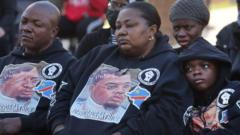In a significant legal blow to Boeing, a plea deal aimed at resolving the aftermath of two deadly crashes has been dismissed by U.S. District Judge Reed O'Connor. The judge's ruling came after months of litigation related to the tragic accidents, which collectively claimed the lives of 346 individuals. Boeing had previously agreed in July to plead guilty to a single count of criminal fraud, submit to external monitoring, and pay a hefty fine of $243 million. However, O'Connor criticized the agreement for providing insufficient authority for the court over the monitoring process.
**Boeing's Plea Deal Dismissed: Court Demands Accountability After Tragic Crashes**

**Boeing's Plea Deal Dismissed: Court Demands Accountability After Tragic Crashes**
A U.S. judge has rejected a plea agreement between Boeing and the government regarding fatal crashes, demanding greater accountability for the aviation giant.
In his ruling, the judge expressed concern about the deal's stipulation regarding diversity in selecting the monitor, asserting that it could compromise the integrity of the selection process. He pointed to the government's historical oversight of Boeing as ineffective and stated that "the public interest requires the Court to step in." Furthermore, families of the victims had labeled the agreement a "sweetheart deal," arguing it failed to adequately hold Boeing accountable.
As Boeing grapples with its ongoing crisis, including recent malfunctions on its planes, the ruling exacerbates the uncertainty surrounding the company's future and its commitment to safety improvements. Erin Appelbaum, an attorney representing families of crash victims, hailed the judgment as a victory for accountability efforts, urging the Department of Justice to prioritize genuine consequences for Boeing.
The court has provided both parties with 30 days to formulate a revised plea agreement that truly reflects the seriousness of Boeing’s offenses, indicating that the legal saga surrounding the aviation company is far from over.
Amidst a growing scrutiny of its safety measures, Boeing faces mounting pressure to restore trust and demonstrate substantial changes in its operational practices.
As Boeing grapples with its ongoing crisis, including recent malfunctions on its planes, the ruling exacerbates the uncertainty surrounding the company's future and its commitment to safety improvements. Erin Appelbaum, an attorney representing families of crash victims, hailed the judgment as a victory for accountability efforts, urging the Department of Justice to prioritize genuine consequences for Boeing.
The court has provided both parties with 30 days to formulate a revised plea agreement that truly reflects the seriousness of Boeing’s offenses, indicating that the legal saga surrounding the aviation company is far from over.
Amidst a growing scrutiny of its safety measures, Boeing faces mounting pressure to restore trust and demonstrate substantial changes in its operational practices.




















